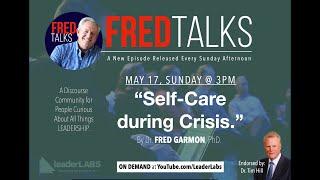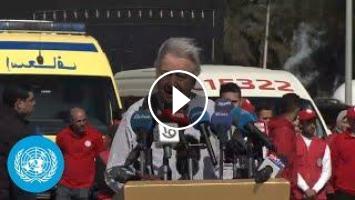UN Secretary-General António Guterres today (23 Mar) told journalists at the Rafah border crossing into Gaza that it is time for a ceasefire and for an "ironclad commitment by Israel" to allow unhindered aid deliveries into the besieged enclave as he began his annual Ramadan solidarity trip.
In a tradition that started when he served as the UN High Commissioner for Refugees to shine a light on Muslim communities in distress, Guterres arrived in Cairo on Saturday, where he reiterated his urgent calls for a humanitarian ceasefire and the cessation of violence, notably in Gaza and Sudan. His visit underscores the UN’s commitment to addressing pressing humanitarian concerns in conflict zones.
During his time in Egypt, the Secretary-General travelled to northern Sinai, a region deeply impacted by conflict.
There, he met with Palestinian civilians from Gaza and their families at the General Hospital in El Arish, Egypt, speaking with women and children who had been injured during the ongoing conflict.
He met with a 10-year-old boy who had lost part of his left hand and badly injured one of his legs. His brother had been killed and another sibling injured.
Later, he met with UN humanitarian workers in Rafah on the Egyptian side to discuss strategies to alleviate the suffering of those caught in the midst of conflict.
At the Rafah border crossing with Gaza Saturday afternoon, he told journalists that Ramadan “is a time for spreading the values of compassion, community and peace.” His visit comes a day after China and Russia vetoed a US-proposed draft resolution that would have had the Security Council deem it imperative to impose a ceasefire and get sorely needed aid into the enclave.
Guterres, “it is monstrous that after so much suffering over so many months, Palestinians in Gaza are marking Ramadan with Israeli bombs still falling, bullets still flying, artillery still pounding, and humanitarian assistance still facing obstacle upon obstacle.”
The Secretary-General said it was “a moral outrage” and added that “any further onslaught will make everything worse. Worse for Palestinian civilians. Worse for the hostages. And worse for all people of the region,” again calling for “an immediate ceasefire.”
He also said it was “time for an ironclad commitment by Israel for total, unfettered access for humanitarian goods throughout Gaza. And in the Ramadan spirit of compassion, it’s time for the immediate release of all hostages.”
Guterres said, “I want Palestinians in Gaza to know: You are not alone. People around the world are outraged by the horrors we are all witnessing in real time. I carry the voices of the vast majority of the world who have seen enough. Who have had enough. And who still believe that human dignity and decency must define us as a global community. It’s our only hope.”
Back at Al Arish Airport, the Secretary-General inspected items that had been rejected by Israel and not allowed to enter Gaza. They included wheelchairs, crutches, soccer balls and cocoa butter.
Guterres took questions from journalists before departing.
He said, “it is very dangerous to distribute humanitarian aid in Gaza. On top of that, law and order have completely been broken, which means that we have witnessed several situations in which the distribution degenerates into a situation of violence, and also, situations in which people were bombed when distribution was taking place. So, there is a fundamental question. There is no way to have an effective aid distribution in Gaza without a humanitarian ceasefire.”
Asked about a possible Israeli ground intervention in Rafah, Guterres said it would be “a humanitarian catastrophe.”
Back in Cairo later in the evening, the Secretary-General, in a symbolic gesture of solidarity, partook in a Ramadan iftar with refugees from Sudan, who have fled their homeland due to ongoing hostilities there.
He emphasized the importance of peace and stability, particularly during the sacred month of Ramadan, urging all parties to observe a cessation of hostilities.
Following his engagements in Egypt, Guterres will proceed to Amman, Jordan, continuing his Ramadan solidarity trip.
In a tradition that started when he served as the UN High Commissioner for Refugees to shine a light on Muslim communities in distress, Guterres arrived in Cairo on Saturday, where he reiterated his urgent calls for a humanitarian ceasefire and the cessation of violence, notably in Gaza and Sudan. His visit underscores the UN’s commitment to addressing pressing humanitarian concerns in conflict zones.
During his time in Egypt, the Secretary-General travelled to northern Sinai, a region deeply impacted by conflict.
There, he met with Palestinian civilians from Gaza and their families at the General Hospital in El Arish, Egypt, speaking with women and children who had been injured during the ongoing conflict.
He met with a 10-year-old boy who had lost part of his left hand and badly injured one of his legs. His brother had been killed and another sibling injured.
Later, he met with UN humanitarian workers in Rafah on the Egyptian side to discuss strategies to alleviate the suffering of those caught in the midst of conflict.
At the Rafah border crossing with Gaza Saturday afternoon, he told journalists that Ramadan “is a time for spreading the values of compassion, community and peace.” His visit comes a day after China and Russia vetoed a US-proposed draft resolution that would have had the Security Council deem it imperative to impose a ceasefire and get sorely needed aid into the enclave.
Guterres, “it is monstrous that after so much suffering over so many months, Palestinians in Gaza are marking Ramadan with Israeli bombs still falling, bullets still flying, artillery still pounding, and humanitarian assistance still facing obstacle upon obstacle.”
The Secretary-General said it was “a moral outrage” and added that “any further onslaught will make everything worse. Worse for Palestinian civilians. Worse for the hostages. And worse for all people of the region,” again calling for “an immediate ceasefire.”
He also said it was “time for an ironclad commitment by Israel for total, unfettered access for humanitarian goods throughout Gaza. And in the Ramadan spirit of compassion, it’s time for the immediate release of all hostages.”
Guterres said, “I want Palestinians in Gaza to know: You are not alone. People around the world are outraged by the horrors we are all witnessing in real time. I carry the voices of the vast majority of the world who have seen enough. Who have had enough. And who still believe that human dignity and decency must define us as a global community. It’s our only hope.”
Back at Al Arish Airport, the Secretary-General inspected items that had been rejected by Israel and not allowed to enter Gaza. They included wheelchairs, crutches, soccer balls and cocoa butter.
Guterres took questions from journalists before departing.
He said, “it is very dangerous to distribute humanitarian aid in Gaza. On top of that, law and order have completely been broken, which means that we have witnessed several situations in which the distribution degenerates into a situation of violence, and also, situations in which people were bombed when distribution was taking place. So, there is a fundamental question. There is no way to have an effective aid distribution in Gaza without a humanitarian ceasefire.”
Asked about a possible Israeli ground intervention in Rafah, Guterres said it would be “a humanitarian catastrophe.”
Back in Cairo later in the evening, the Secretary-General, in a symbolic gesture of solidarity, partook in a Ramadan iftar with refugees from Sudan, who have fled their homeland due to ongoing hostilities there.
He emphasized the importance of peace and stability, particularly during the sacred month of Ramadan, urging all parties to observe a cessation of hostilities.
Following his engagements in Egypt, Guterres will proceed to Amman, Jordan, continuing his Ramadan solidarity trip.
- Category
- United Nations
- Tags
- UN, United Nations, UNGA
Be the first to comment













